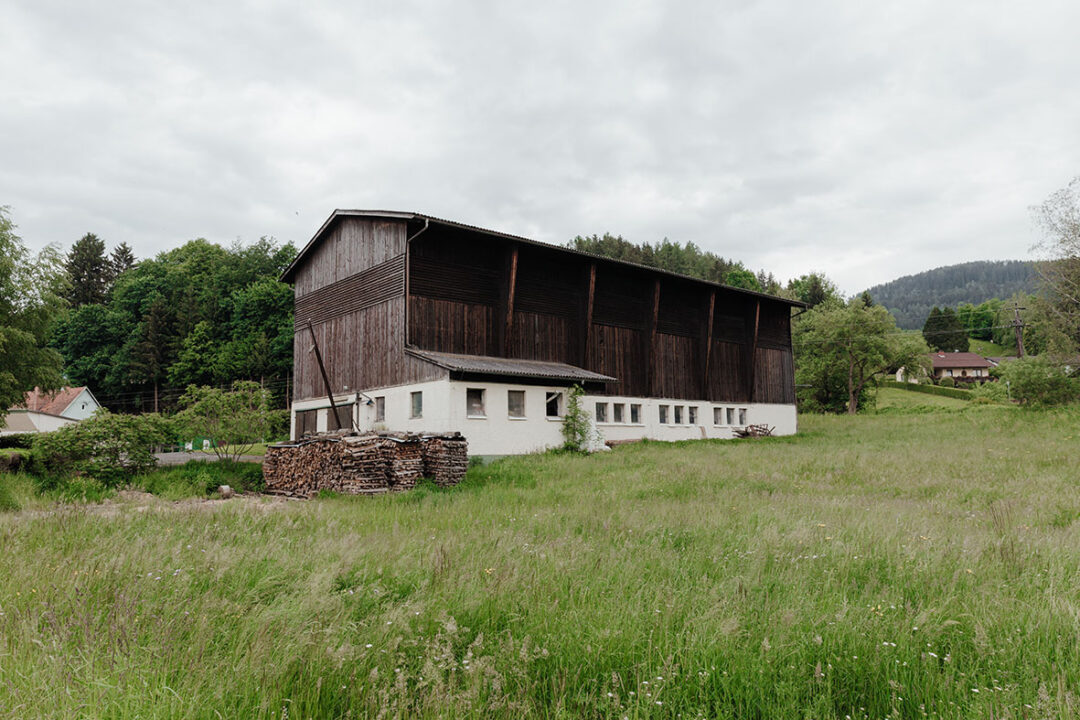
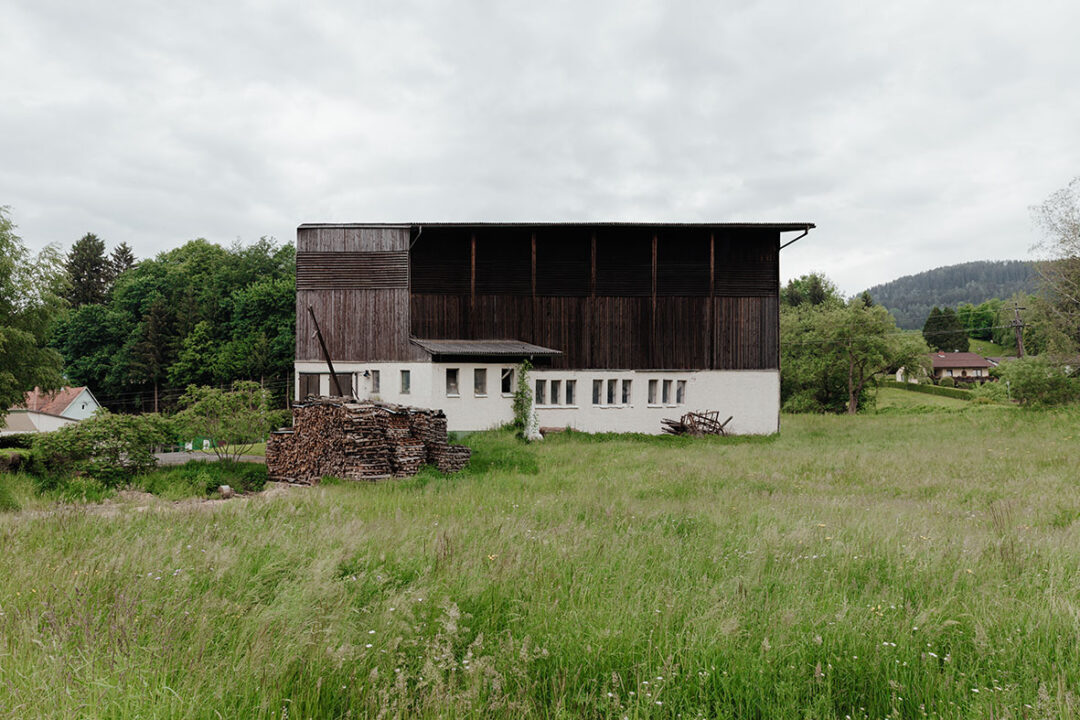
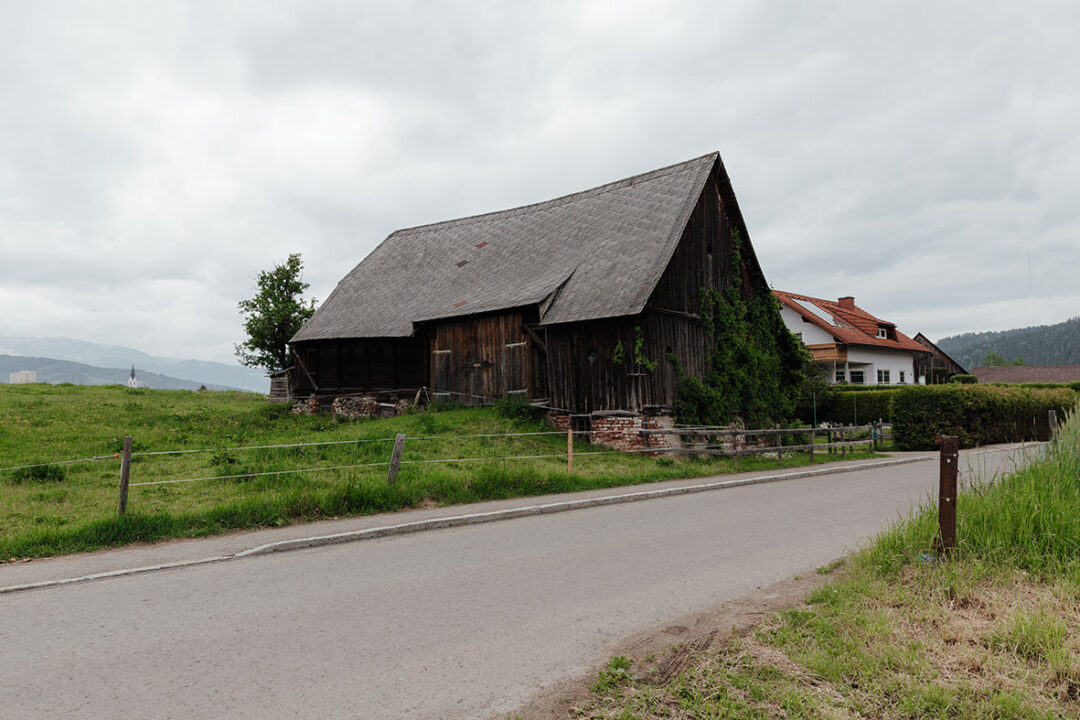
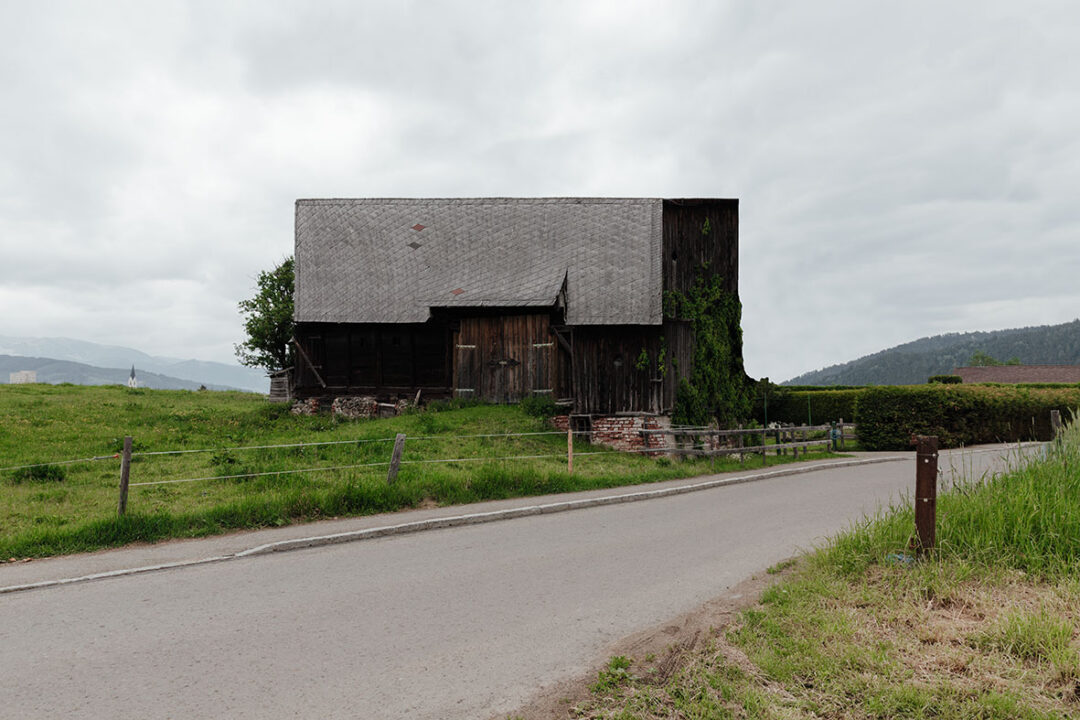
very unintelligent work
Exhibition
Die Angewandte / Abteilung Ortsbezogene Kunst Paulusplatz 5, 1030 Wien
3.10.—4.11.2025
Artists: Brenner-Havelka-Plessl-Kindler
Curator: Brenner-Havelka-Plessl-Kindler
The series “Stall” began in 2020 as a factual, photo-documentary archive of traditional barn structures in Upper Styria and has been ongoing ever since. The conceptual approach lies in capturing rural architecture in its clarity and functionality, and subsequently transforming it through manual image editing in Photoshop. Each photograph is taken with exactly the same composition and framing in order to maintain documentary precision. Perspective distortions are deliberately avoided so that the form and structure of the buildings remain visible in their purest, most functional state. Over time, the project expanded to include barns from other regions closely connected to the biographies of Brenner–Havelka–Plessl: Prad am Stilfserjoch (Trentino-South Tyrol, Italy), Brno (Moravia, Czech Republic), and the Murtal (Upper Styria, Austria). This results in a personal, geographically rooted atlas of rural architecture in Central Europe. The project is realized in collaboration with photographer Daniel Kindler, whose images serve as the foundation for the subsequent visual processing. The editing of the photographs goes far beyond simple technical correction. It is a conscious, manual intervention—an old-fashioned act of design, in which the forms of the barns are digitally altered by hand. This process stands in contrast to the common use of artificial intelligence (AI) in contemporary image editing, which could easily automate such tasks. By insisting on manual manipulation, the human creative act remains at the center of the work. The editing process points to the relationship between humans and their environment—much like the physical, nonautomated labor on farms, where each step is determined by human effort. The exhibition “very unintelligent work” references the tradition of New Objectivity and introduces, for the first time, the term Austrian Objectivity—an approach focused on presenting things in their own “simplicity” and “beauty.” At the same time, the concept of objectivity is critically examined: through exaggerated reduction and forced uniformity, it is driven to absurdity—until, in the end, all that remains is a box.
Attention: For details on accessibility, please contact the program partner directly.
Please note the different venues and opening hours for this exhibition:
Kunstraum am Schauplatz
Praterstraße 42
1020 Vienna
03.10.–18.10.2025
Tue–Sun: 11 AM–8 PM
University of Applied Arts Vienna
Site-Specific Art
Exhibition Space
Paulusplatz 5
1030 Vienna
13.10.–19.10.2025
Tue–Sun: 4–8 PM
Foto Arsenal und
Heeresgeschichtliches Museum
Site-Specific Intervention “Hay Bales”
Arsenal 1,
1030 Vienna
26.09.–04.11.2025
Mon–Sun: 24/7
Attention: For details on accessibility, please contact the program partner directly.
Please note the different venues and opening hours for this exhibition:
Kunstraum am Schauplatz
Praterstraße 42
1020 Vienna
03.10.–18.10.2025
Tue–Sun: 11 AM–8 PM
University of Applied Arts Vienna
Site-Specific Art
Exhibition Space
Paulusplatz 5
1030 Vienna
13.10.–19.10.2025
Tue–Sun: 4–8 PM
Foto Arsenal und
Heeresgeschichtliches Museum
Site-Specific Intervention “Hay Bales”
Arsenal 1,
1030 Vienna
26.09.–04.11.2025
Mon–Sun: 24/7
Please note the different venues and opening hours for this exhibition.
free entry Barrier-free
Artists: Brenner-Havelka-Plessl-Kindler
Curator: Brenner-Havelka-Plessl-Kindler
The series “Stall” began in 2020 as a factual, photo-documentary archive of traditional barn structures in Upper Styria and has been ongoing ever since. The conceptual approach lies in capturing rural architecture in its clarity and functionality, and subsequently transforming it through manual image editing in Photoshop. Each photograph is taken with exactly the same composition and framing in order to maintain documentary precision. Perspective distortions are deliberately avoided so that the form and structure of the buildings remain visible in their purest, most functional state. Over time, the project expanded to include barns from other regions closely connected to the biographies of Brenner–Havelka–Plessl: Prad am Stilfserjoch (Trentino-South Tyrol, Italy), Brno (Moravia, Czech Republic), and the Murtal (Upper Styria, Austria). This results in a personal, geographically rooted atlas of rural architecture in Central Europe. The project is realized in collaboration with photographer Daniel Kindler, whose images serve as the foundation for the subsequent visual processing. The editing of the photographs goes far beyond simple technical correction. It is a conscious, manual intervention—an old-fashioned act of design, in which the forms of the barns are digitally altered by hand. This process stands in contrast to the common use of artificial intelligence (AI) in contemporary image editing, which could easily automate such tasks. By insisting on manual manipulation, the human creative act remains at the center of the work. The editing process points to the relationship between humans and their environment—much like the physical, nonautomated labor on farms, where each step is determined by human effort. The exhibition “very unintelligent work” references the tradition of New Objectivity and introduces, for the first time, the term Austrian Objectivity—an approach focused on presenting things in their own “simplicity” and “beauty.” At the same time, the concept of objectivity is critically examined: through exaggerated reduction and forced uniformity, it is driven to absurdity—until, in the end, all that remains is a box.
Attention: For details on accessibility, please contact the program partner directly.
Please note the different venues and opening hours for this exhibition:
Kunstraum am Schauplatz
Praterstraße 42
1020 Vienna
03.10.–18.10.2025
Tue–Sun: 11 AM–8 PM
University of Applied Arts Vienna
Site-Specific Art
Exhibition Space
Paulusplatz 5
1030 Vienna
13.10.–19.10.2025
Tue–Sun: 4–8 PM
Foto Arsenal und
Heeresgeschichtliches Museum
Site-Specific Intervention “Hay Bales”
Arsenal 1,
1030 Vienna
26.09.–04.11.2025
Mon–Sun: 24/7
Attention: For details on accessibility, please contact the program partner directly.
Please note the different venues and opening hours for this exhibition:
Kunstraum am Schauplatz
Praterstraße 42
1020 Vienna
03.10.–18.10.2025
Tue–Sun: 11 AM–8 PM
University of Applied Arts Vienna
Site-Specific Art
Exhibition Space
Paulusplatz 5
1030 Vienna
13.10.–19.10.2025
Tue–Sun: 4–8 PM
Foto Arsenal und
Heeresgeschichtliches Museum
Site-Specific Intervention “Hay Bales”
Arsenal 1,
1030 Vienna
26.09.–04.11.2025
Mon–Sun: 24/7
Events related to this exhibition:
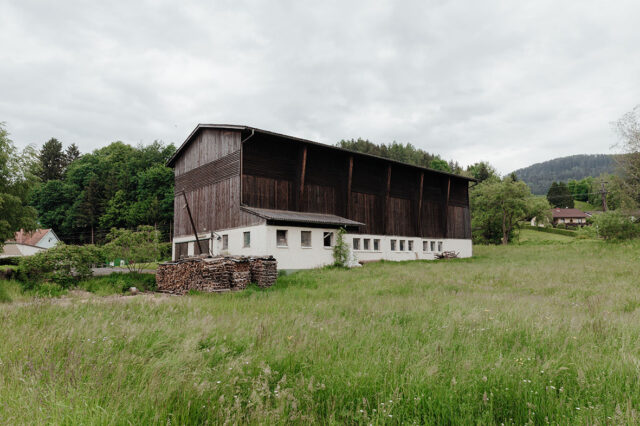
| 18.30—22 Uhr
The series “Stall” began in 2020 as a factual, photo-documentary archive of traditional barn structures in Upper Styria and has been ongoing ever since. The conceptual approach lies in capturing rural architecture in its clarity and functionality, and subsequently...
Opening hours:
Please note the different venues and opening hours for this exhibition.
Address:
Paulusplatz 5
1030 Wien
Paulusplatz 5
1030 Wien